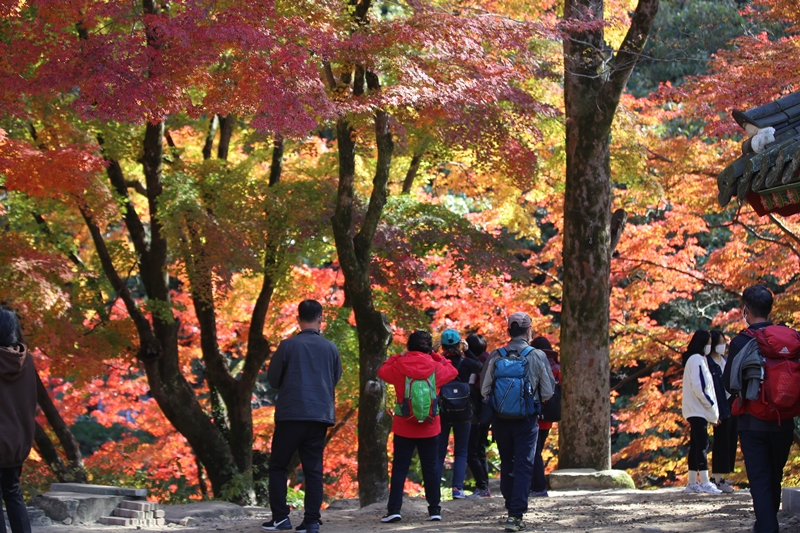-
 Korea.net's 24-hour YouTube channel
Korea.net's 24-hour YouTube channel- NEWS FOCUS
- ABOUT KOREA
- EVENTS
- RESOURCES
- GOVERNMENT
- ABOUT US

The government on Nov. 1 at 5 a.m. started the first phase of its four-week "phased return to daily life." Shown here is a scene at Naejangsan National Park in Jangseong-gun County, Jeollanam-do Province, the day before the measure took effect. (Yonhap News)
By Park Hye Ri and Kim Hayeon
The first stage of the government program for a "phased return to daily life" on Nov. 1 began at 5 a.m.
Whether the program can help return life to how it was pre-pandemic is attracting keen attention.
The major change in the first phase is the lifting of all limits on operating hours at most multipurpose facilities except those for evening entertainment. Most businesses such as restaurants and cafes can operate around the clock, while high-risk facilities like nightlife establishments, cola-teques (daytime elderly dance clubs) and nightclubs can remain open until midnight.
The size of a private gathering will also be raised to 10 people in the Seoul metropolitan region and 12 in the rest of the country regardless of vaccination status. The limit of four per group at cafes and restaurants, however, remains for those with no vaccination at all or are only partially vaccinated. Events and demonstrations are permitted for up to 99 people if unvaccinated people attend, and the limit rises to 499 if everyone who attends are either fully vaccinated or submit a negative test for COVID-19.
The "quarantine pass," or a certificate verifying vaccination or a negative test for COVID-19, applies to facilities at high risk of infection such as indoor gyms, public baths and noraebang (karaoke rooms).
Pass holders with either certification of full vaccination or the recent negative result of a polymerase chain reaction (PCR) test can consume popcorn and beverages at a movie theater or chicken and beer at an indoor sports stadium in separate sections for the fully vaccinated.
The government through Nov. 7 will run a week-long grace period to avoid confusion in the early stage of adopting the pass system. The grace period for indoor gyms and sports facilities is through Nov. 14.
From Nov. 22, in-person attendance at kindergarten and elementary, middle and high school will resume in the Greater Seoul area. The Ministry of Education will allow in-person classes from that date, the first Monday after this year's College Scholastic Ability Test scheduled for Nov. 18. This move will come 20 months after online classes began last year on April 9.
The Central Disaster and Safety Countermeasures Headquarters will enforce a three-stage transition to the phased return to daily life by easing quarantine measures three times, with an interval of six weeks between each stage.
Phase 2 begins on Dec. 13 and the last on Jan. 24. Each phase will remain in effect for four weeks, and at the end of each, health authorities will decide whether to advance to the next stage after monitoring the situation for two more weeks.
hrhr@korea.kr
Most popular
- China warmly welcomes first Korea-born giant panda Fu Bao
- First hearing-impaired K-pop act hopes for 'barrier-free world'
- Novelist Hwang's 'Mater 2-10' shortlisted for Int'l Booker Prize
- Expats could account for 7% of population in 20 years: report
- Nat'l Fire Agency picks 137 elite staff for deployment abroad













